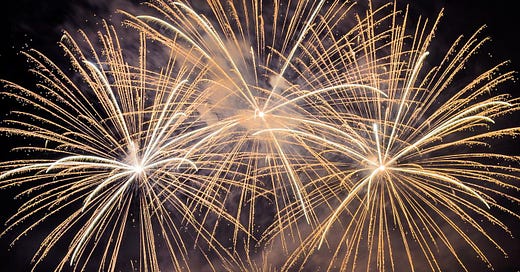The Grand Finale
Let's workshop this poem about a father's self-conscious alienation from the present during a fourth of July fireworks event
The Grand Finale From a pause in the one-by-one launch pattern, a pause of protracted silence—almost at once, four tiny-tailed orbs ascend into the smoky black. Upon reaching hushed apices varied in height, swift-swelling blooms of radial filaments spider the all-eyed firmament, illumining neon a peopled field—and its glowsticks and snacks, its blankets and flags—toward which they start their shaggy-dog weep just as the flam of booms reaches ear. To heighten their viewing pleasure some go hard at their vapes and beers. Others (typically dads, boyfriends, know-it-all boys), enlivened by being witnessed being right, forecast the start of the grand finale. Children in earshot brace themselves—a few with hands squeezing back pee—even if the echoing phrase is a mystery. But the one-by-one returns. Uneasy about others having noticed their mistake, the forecasters gulp— distracted from the coconuts and waterfalls longer than those who noticed their mistake. One dad finds no relief in the chance that, given the length of the show so far, the term “start” is broad enough to have made his forecast not wholly wrong. Instead of slinking into silence, however, a three-by-three has him voice a new forecast, one he cannot help shouting to his daughter under peony sky louder even than before. “Yeah! Now here’s the finale!” Hoping to avert eliciting from her, his own fruit, that traitorous blow (“Why are you acting funny?”), he is quick to look away from her face furrows— deepened by the glow-necklace—confirming, yes, that the affectation of his over-the-top locution (that of employees giving shoppers explanations while the boss hovers, shifting random items), has turned guardian into stranger (as did seeing is own dad’s face the first time shaved in a mirror). The glinting flex of temple muscles show his fear— close to a minute later—that blow can still come, as his sits too upright with a grin too expectant. Sensing the grin has been seen through as false, he tries to undo it, relaxing his face in increments, as if to coax doubt about it ever having been seen. Odds are even the most sensitive, those who suffer with him mortification over his second mistake, have forgotten him by the time the torrent begins. Knowing this, though, is no relief for him. Mired in a wincer, a cringer, under the burden of which he will hunch whenever the ghost of this event returns (at the supermarket, at the dinner table), and from which right now perhaps his only respite is the prayer not to be called-out by his daughter or, for that matter, other kids (some with parents, by this time, praying for the same), the man misses the grand finale polychromatic in his vacant eyes.
This poem is unpublished
Photo: pinterest.com.au/pin/369998925615236025/





